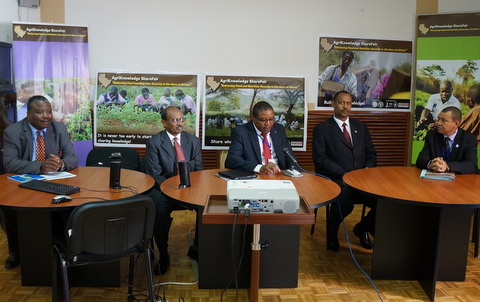 Addis Ababa, Ethiopia – Fifteen countries from Africa’s most drought prone regions are meeting in the Ethiopian capital Addis Ababa to share practices on how to best address recurrent droughts and chronic food insecurity on the continent.
Addis Ababa, Ethiopia – Fifteen countries from Africa’s most drought prone regions are meeting in the Ethiopian capital Addis Ababa to share practices on how to best address recurrent droughts and chronic food insecurity on the continent.
Governments and organizations from Africa’s Horn and Sahel regions are showcasing initiatives on some of the good agricultural practices with a view of easing the impact of recurrent droughts on the continent’s productivity. Both regions suffer recurrent and severe droughts, sometimes leading to famine.
“The AgriKnowledge ShareFair is a unique platform to cultivate knowledge sharing, in all dimensions, about interventions that can improve food and nutrition security, “ said Castro Camarada, the sub regional coordinator for the UN Food and Agriculture Organization.
The Horn of Africa is one of the most food-insecure regions in the world, with the highest malnutrition rates, severe food shortages and high food prices.
A shared vision
A three-day fair, which kicked off on Tuesday, has attracted participation of 15 countries and is organized by the Intergovernmental Authority on Development (IGAD), the Food and Agriculture Organization (FAO), the International Fund for Agricultural Development (IFAD), the World Food Programme, the United Nations Children’s Fund (UNICEF) and the Eastern African Grain Council (EAGC). Participating countries include, Ethiopia, Somalia, Djibouti, Kenya, Uganda, Rwanda, Burundi, Sudan, South Sudan, Niger, Mali, Burkina Faso, Gambia, Chad and Senegal.

Mr. Mohamed Moussa
IGAD’s Director of Agriculture and Environment, Mr. Mohamed Moussa warned that the region risks loosing food security gains due to lack of a shared vision on how to best deal with chronic food insecurity.
Mr. Moussa said: “Recurrent crises in the Horn of Africa are stark evidence that insufficient attention has been given to addressing the root causes of chronic and transitory vulnerability in the region.”
“It is practically doable to end emergencies in a very short time, by providing farmers with the necessary and appropriate technological inputs (improved seeds and fertilizers) and accompanying services especially agricultural extension and micro-credit,” he added.
Improving knowledge sharing on interventions that have succeeded in easing food insecurity and nutrition in the region, with focus on livestock marketing and value chain, water and land, agricultural technologies and cash based interventions.
Upscaling for resilience
With successful but often small-scale initiatives going on the region, agencies in the frontline of the fight against food insecurity and malnutrition hope to identify best practices and upscale them across the region to increase drought resilience.

Mr. Castro Camarada addresses the meeting
“The essence of identifying and sharing good practices is to develop the numerous success cases across the region a view of upscaling them in some of the most vulnerable communities for quick impact,” said FAO’s Castro Camarada.

H.E Ato Mitiku Kassa
The AgriKnowledge ShareFair was officially opened by His Excellency Ato Mitiku Kassa, Ethiopian State Minister of Agriculture.
In his speech, he welcomed all participants. He said, “Fighting poverty and food insecurity is a qualitative commitment that drives institution and calls upon the engagement of individuals at all levels. In a interconnected globalized world, there is a need to balance commencing new research and gather existing information.
“In the context of food security, outstanding achievements have already been obtained, thus the challenge is to identify where significant achievements have been made and actors who have made progress to in-cooperate relevant information and lessons to our existing reality.”
For more information, please visit
https://sfhoafrica.wordpress.com

